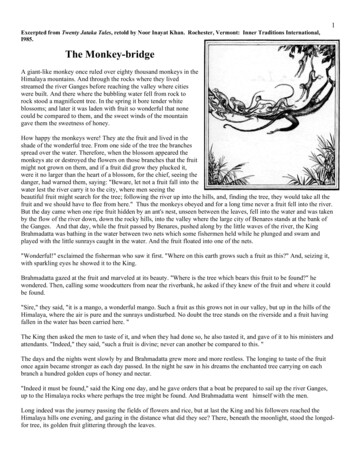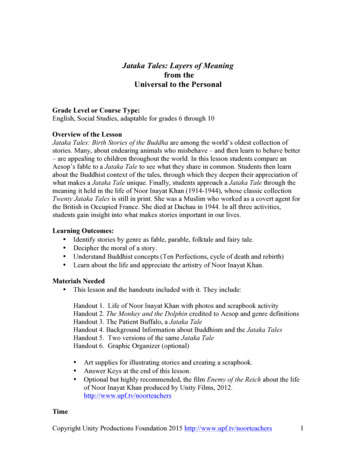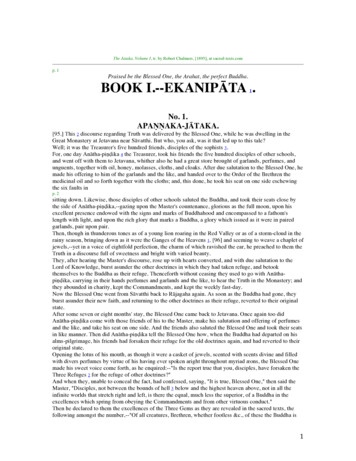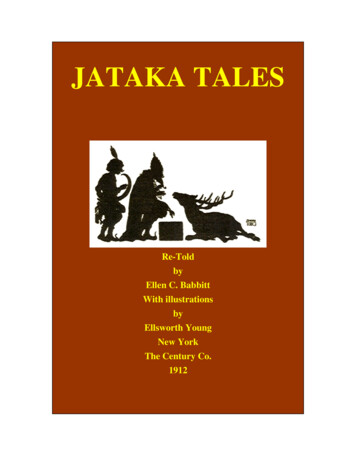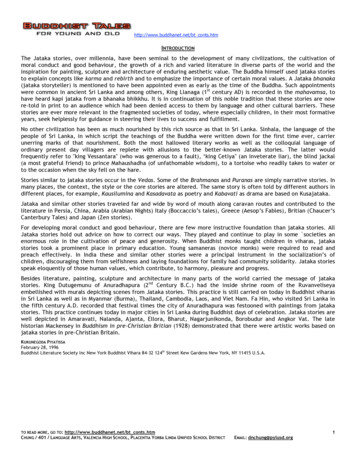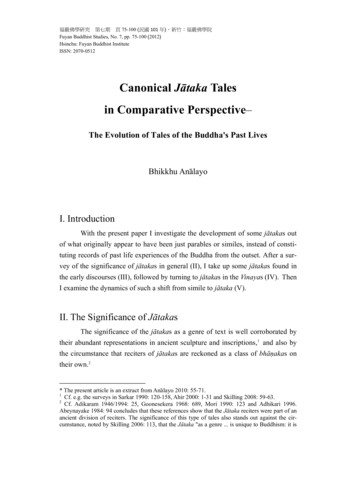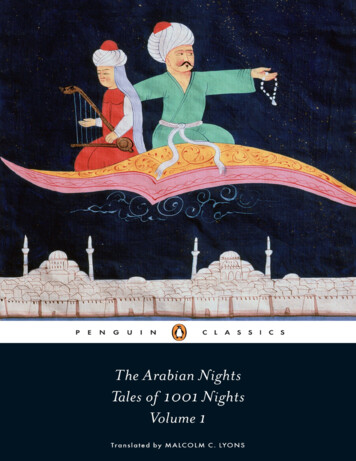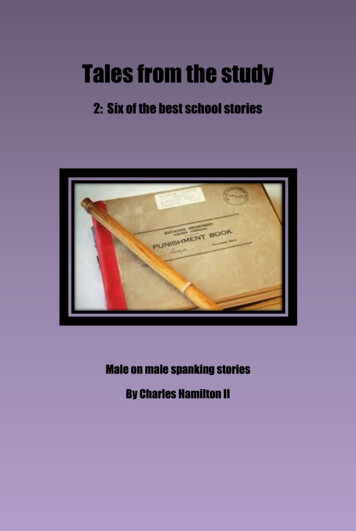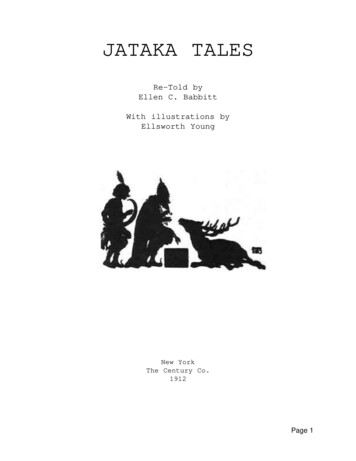
Transcription
JATAKA TALESRe-Told byEllen C. BabbittWith illustrations byEllsworth YoungNew YorkThe Century Co.1912Page 1
FOREWORDLong ago I was captivated by the charm of the Jataka Talesand realized the excellent use that might be made of them inthe teaching of children. The obvious lessons are many of themsuitable for little people, and beneath the obvious there aredepths and depths of meaning which they may learn to fathomlater on. The Oriental setting lends an additional fascination.I am glad that Miss Babbitt has undertaken to put together thiscollection, and commend it freely to teachers and parents.FELIX ADLER.Page 2
PUBLISHER’S NOTEThe Jatakas, or Birth-stories, form one of the sacred booksof the Buddhists and relate to the adventures of the Buddha inhis former existences, the best character in any story beingidentified with the Master.These legends were continually introduced into the religious discourses of the Buddhist teachers to illustrate thedoctrines of their faith or to magnify the glory and sanctityof the Buddha, somewhat as medieval preachers in Europe used toenliven their sermons by introducing fables and popular talesto rouse the flagging interest of their hearers.Sculptured scenes from the Jatakas, found upon the carvedrailings around the relic shrines of Sanchi and Amaravati andof Bharhut, indicate that the “Birth-stories” were widely knownin the third century B.C., and were then considered as part ofthe sacred history of the religion. At first the tales wereprobably handed down orally, and it is uncertain when they wereput together in systematic form.While some of the stories are Buddhistic and depend fortheir point on some custom or idea peculiar to Buddhism, manyare age-old fables, the flotsam and jetsam of folk-lore, whichhave appeared under various guises throughout the centuries, aswhen they were used by Boccaccio or Poggio, merely as merrytales, or by Chaucer, who unwittingly puts a Jataka story intothe mouth of his pardoners when he tells the tale of “theRyotoures three.”Quaint humor and gentle earnestness distinguish these legends and they teach many wholesome lessons, among them the dutyof kindness to animals.Dr. Felix Adler in his “Moral Instruction of Children,”says:The Jataka Tales contain deep truths, and are calculated toimpress lessons of great moral beauty. The tale of the Merchantof Seri, who gave up all that he had in exchange for a goldendish, embodies much the same idea as the parable of the priceless Pearl, in the New Testament. The tale of the Measures ofRice illustrates the importance of a true estimate of values.The tale of the Banyan Deer, which offered its life to save aPage 3
roe and her young, illustrates self-sacrifice of the noblestsort. The tale of the Sandy Road is one of the finest in thecollection.And he adds that these tales “are, as everyone must admit,nobly conceived, lofty in meaning, and many a helpful sermonmight be preached from them as texts.”Page 4
JATAKA TALESITHE MONKEY AND THE CROCODILEPART IA MONKEY lived in a great tree ona river bank.In the river there were manyCrocodiles. A Crocodile watched the Monkeys for a long time,and one day she said to her son: "My son, get one of thoseMonkeys for me. I want the heart of a Monkey to eat.""How am I to catch a Monkey?" asked the little Crocodile."I do not travel on land, and the Monkey does not go into thewater.""Put your wits to work, and you'll find a way," said themother.And the little Crocodile thought and thought.At last he said to himself: "I know what I'll do. I'll getthat Monkey that lives in a big tree on the river bank. Hewishes to go across the river to the island where the fruit isso ripe."So the Crocodile swam to the tree where the Monkey lived.But he was a stupid Crocodile."Oh, Monkey," he called, "come with me over to the islandwhere the fruit is so ripe.""How can I go with you?" asked the Monkey. "I do not swim.""No--but I do. I will take you over on my back," said theCrocodile.The Monkey was greedy, and wanted the ripe fruit, so hejumped down on the Crocodile's back."Off we go!" said the Crocodile.Page 5
"This is a fine ride you are giving me!" said the Monkey."Do you think so? Well, how do you like this?" asked theCrocodile, diving."Oh, don't!" cried the Monkey, as he went under the water.He was afraid to let go, and he did not know what to do underthe water.When the Crocodile came up, the Monkey sputtered andchoked. "Why did you take me under water, Crocodile?" he asked."I am going to kill you by keeping you under water,"answered the Crocodile. "My mother wants Monkey-heart to eat,and I'm going to take yours to her.""I wish you had told me you wanted my heart," said theMonkey, "then I might have brought it with me.""How queer!" said the stupid Crocodile. "Do you mean to saythat you left your heart back there in the tree?""That is what I mean," said the Monkey. "If you want myheart, we must go back to the tree and get it. But we are sonear the island where the ripe fruit is, please take me therefirst.""No, Monkey," said the Crocodile, "I'll take you straightback to your tree. Never mind the ripe fruit. Get your heartand bring it to me at once. Then we'll see about going to theisland.""Very well," said the Monkey.But no sooner had he jumped onto the bank of the riverthan--whisk! up he ran into the tree.Page 6
From the topmost branches he called down to the Crocodilein the water below:"My heart is way up here! If you want it, come for it, comefor it!"PART IITHE Monkey soon moved away from that tree.He wanted to get away from the Crocodile, so that he mightlive in peace.But the Crocodile found him, far down the river, living inanother tree.In the middle of the river was an island covered withfruit-trees.Half-way between the bank of the river and the island, alarge rock rose out of the water. The Monkey could jump to therock, and then to the island. The Crocodile watched the Monkeycrossing from the bank of the river to the rock, and then tothe island.He thought to himself, "The Monkey will stay on the islandall day, and I'll catch him on his way home at night."The Monkey had a fine feast, while the Crocodile swamabout, watching him all day.Toward night the Crocodile crawled out of the water and layon the rock, perfectly still.When it grew dark among the trees, the Monkey started forhome. He ran down to the river bank, and there he stopped."What is the matter with the rock?" the Monkey thought tohimself. "I never saw it so high before. The Crocodile is lyingon it!"Page 7
But he went to the edge of the water and called: "Hello,Rock!"No answer.Then he called again: "Hello, Rock!"Three times the Monkey called, and then he said: "Why isit, Friend Rock, that you do not answer me to-night?""Oh," said the stupid Crocodile to himself, "the rockanswers the Monkey at night. I'll have to answer for the rockthis time."So he answered: "Yes, Monkey! What is it?"The Monkey laughed, and said: "Oh, it's you, Crocodile, isit?""Yes," said the Crocodile. "I am waiting here for you. I amgoing to eat you.""You have caught me in a trap this time," said the Monkey."There is no other way for me to go home. Open your mouth wideso I can jump right into it."Now the Monkey well knew that when Crocodiles open theirmouths wide, they shut their eyes.While the Crocodile lay on the rock with his mouth wideopen and his eyes shut, the Monkey jumped.But not into his mouth! Oh, no! He landed on the top of theCrocodile's head, and then sprang quickly to the bank. Up hewhisked into his tree.Page 8
When the Crocodile saw the trick the Monkey had played onhim, he said: "Monkey, you have great cunning. You know nofear. I'll let you alone after this.""Thank you, Crocodile, but I shall be on the watch for youjust the same," said the Monkey.Page 9
IIHOW THE TURTLE SAVED HIS OWN LIFEA KING once had a lake made in the courtyard for the youngprinces to play in. They swam about in it, and sailed theirboats and rafts on it. One day the king told them he had askedthe men to put some fishes into the lake.Off the boys ran to see the fishes. Now, along with thefishes, there was a Turtle. The boys were delighted with thefishes, but they had never seen a Turtle, and they were afraidof it, thinking it was a demon. They ran back to their father,crying, "There is a demon on the bank of the lake."The king ordered his men to catch the demon, and to bringit to the palace. When the Turtle was brought in, the boyscried and ran away.The king was very fond of his sons, so he ordered the menwho had brought the Turtle to kill it."How shall we kill it?" they asked."Pound it to powder," said some one. "Bake it in hotcoals," said another.So one plan afteranother was spoken of.Then an old man who hadalways been afraid ofthe water said: "Throwthe thing into the lakewhere it flows out overthe rocks into theriver. Then it willsurely be killed."When the Turtleheard what the old mansaid, he thrust out his head and asked: "Friend, what have Idone that you should do such a dreadful thing as that to me?The other plans were bad enough, but to throw me into the lake!Don't speak of such a cruel thing!"Page 10
When the king heard what the Turtle said, he told his mento take the Turtle at once and throw it into the lake.The Turtle laughed to himself as he slid away down theriver to his old home. "Good!" he said, "those people do notknow how safe I am in the water!"Page 11
IIITHE MERCHANT OF SERITHERE was once a merchant of Seri who sold brass and tinware. He went from town to town, in company with another man,who also sold brass and tinware. This second man was greedy,getting all he could for nothing, and giving as little as hecould for what he bought.When they went into a town, they divided the streetsbetween them. Each man went up and down the streets he had chosen, calling, "Tinware for sale. Brass for sale." People cameout to their door-steps, and bought, or traded, with them.In one house there lived a poor old woman and her granddaughter. The family had once been rich, but now the only thingthey had left of all their riches was a golden bowl. The grandmother did not know it was a golden bowl, but she had kept thisbecause her husband used to eat out of it in the old days. Itstood on a shelf among the other pots and pans, and was notoften used.The greedy merchantpassed this house, calling, "Buy my water-jars!Buy my pans!" The granddaughter said: "Oh,Grandmother, do buy something for me!""My dear," said theold woman, "we are toopoor to buy anything. I have not anything to trade, even.""Grandmother, see what the merchant will give for the oldbowl. We do not use that, and perhaps he will take it and giveus something we want for it."The old woman called the merchant and showed him the bowl,saying, "Will you take this, sir, and give the little girl heresomething for it?"The greedy man took the bowl and scratched its side with aneedle. Thus he found that it was a golden bowl. He hoped hecould get it for nothing, so he said: "What is this worth? NotPage 12
even a halfpenny." He threw the bowl on the ground, and wentaway.By and by the other merchant passed the house. For it wasagreed that either merchant might go through any street whichthe other had left. He called: "Buy my water-jars! Buy my tinware! Buy my brass!"The little girl heard him, and begged her grandmother tosee what he would give for the bowl."My child," said the grandmother, "the merchant who wasjust here threw the bowl on the ground and went away. I havenothing else to offer in trade.""But, Grandmother," said the girl, "that was a cross man.This one looks pleasant. Ask him. Perhaps he 'll give some little tin dish.""Call him, then, and show it to him," said the old woman.As soon as the merchant took the bowl in his hands, he knewit was of gold. He said: "All that I have here is not worth somuch as this bowl. It is a golden bowl. I am not rich enough tobuy it.""But, sir, a merchantwho passed here a fewmoments ago, threw it onthe ground, saying it wasnot worth a halfpenny,and he went away," saidthe grandmother. "It wasworth nothing to him. Ifyou value it, take it,giving the little girlsome dish she likes forit."But the merchant would not have it so. He gave the womanall the money he had, and all his wares. "Give me but eightpennies," he said.Page 13
So he took the pennies, and left. Going quickly to theriver, he paid the boatman the eight pennies to take him acrossthe river.Soon the greedy merchant went back to the house where hehad seen the golden bowl, and said: "Bring that bowl to me, andI will give you something for it.""No," said the grandmother. "You said the bowl was worthless, but another merchant has paid a great price for it, andtaken it away."Then the greedy merchant was angry, crying out, "Throughthis other man I have lost a small fortune. That bowl was ofgold."He ran down to the riverside, and, seeing the other merchant in the boat out in the river, he called: "Hallo, Boatman!Stop your boat!"But the man in the boat said: "Don't stop!" So he reachedthe city on the other side of the river, and lived well for atime on the money the bowl brought him.Page 14
IVTHE TURTLE WHO COULDN'T STOP TALKINGA TURTLE lived in a pond at the foot of a hill. Two youngwild Geese, looking for food, saw the Turtle, and talked withhim. The next day the Geese came again to visit the Turtle andthey became very well acquainted. Soon they were great friends."Friend Turtle," the Geese said one day, "we have a beautiful home far away. We are going to fly back to it to-morrow. Itwill be a long but pleasant journey. Will you go with us?""How could I? I have no wings," said the Turtle."Oh, we will takeyou, if only you cankeep your mouth shut,and say not a word toanybody," they said."I can do that,"said the Turtle. "Dotake me with you. I will do exactly as you wish."So the next day the Geese brought a stick and they held theends of it. "Now take the middle of this in your mouth, anddon't say a word
The Jataka Tales contain deep truths, and are calculated to impress lessons of great moral beauty. The tale of the Merchant of Seri, who gave up all that he had in exchange for a golden dish, embodies much the same idea as the parable of the price-less Pearl, in the New Testament. The tale of the Measures of Rice illustrates the importance of a true estimate of values. The tale of the Banyan .

